Organisational Behaviour: Culture, Power & Motivation at Morrisons
VerifiedAdded on 2023/06/18
|17
|4733
|53
Report
AI Summary
This report provides an analysis of organisational behaviour within Morrisons, a major UK supermarket chain. It examines how organisational culture, power structures, and internal politics influence individual and team performance. The report utilises Handy's Cultural Model to assess Morrisons' culture, focusing on power, task, person, and role cultures. It also discusses various forms of power within the organisation, including legitimate, reward, and coercive power. Furthermore, the report explores the impact of organisational politics on employee motivation and productivity, highlighting the importance of addressing negative behaviours. Motivational theories, specifically content theory, including Maslow's Hierarchy of Needs, are examined to understand how Morrisons can effectively motivate its employees by addressing their physiological, safety, social, esteem, and self-actualisation needs. The report also touches on the characteristics of effective and ineffective teams and applies organisational behaviour concepts to improve overall organisational performance.
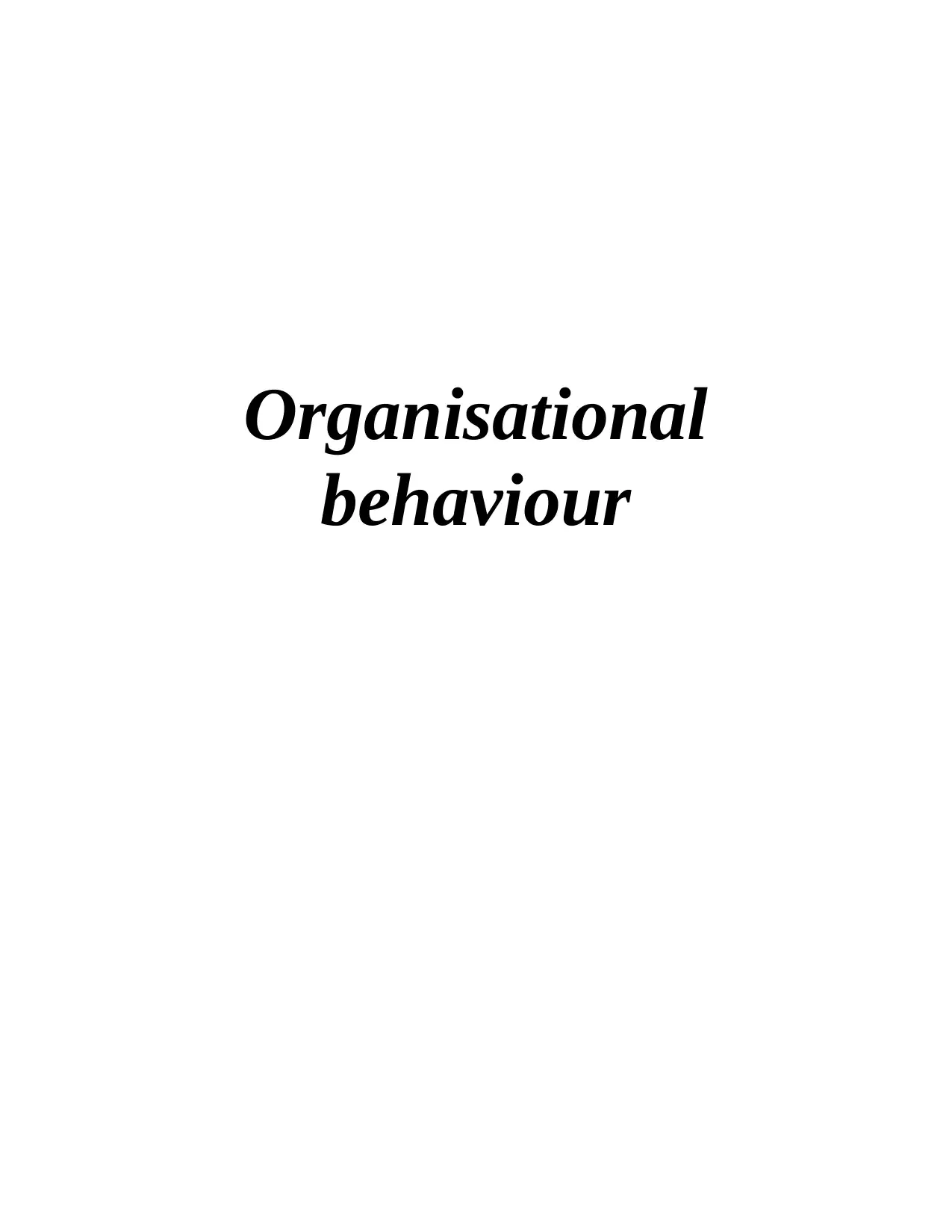
Organisational
behaviour
behaviour
Paraphrase This Document
Need a fresh take? Get an instant paraphrase of this document with our AI Paraphraser
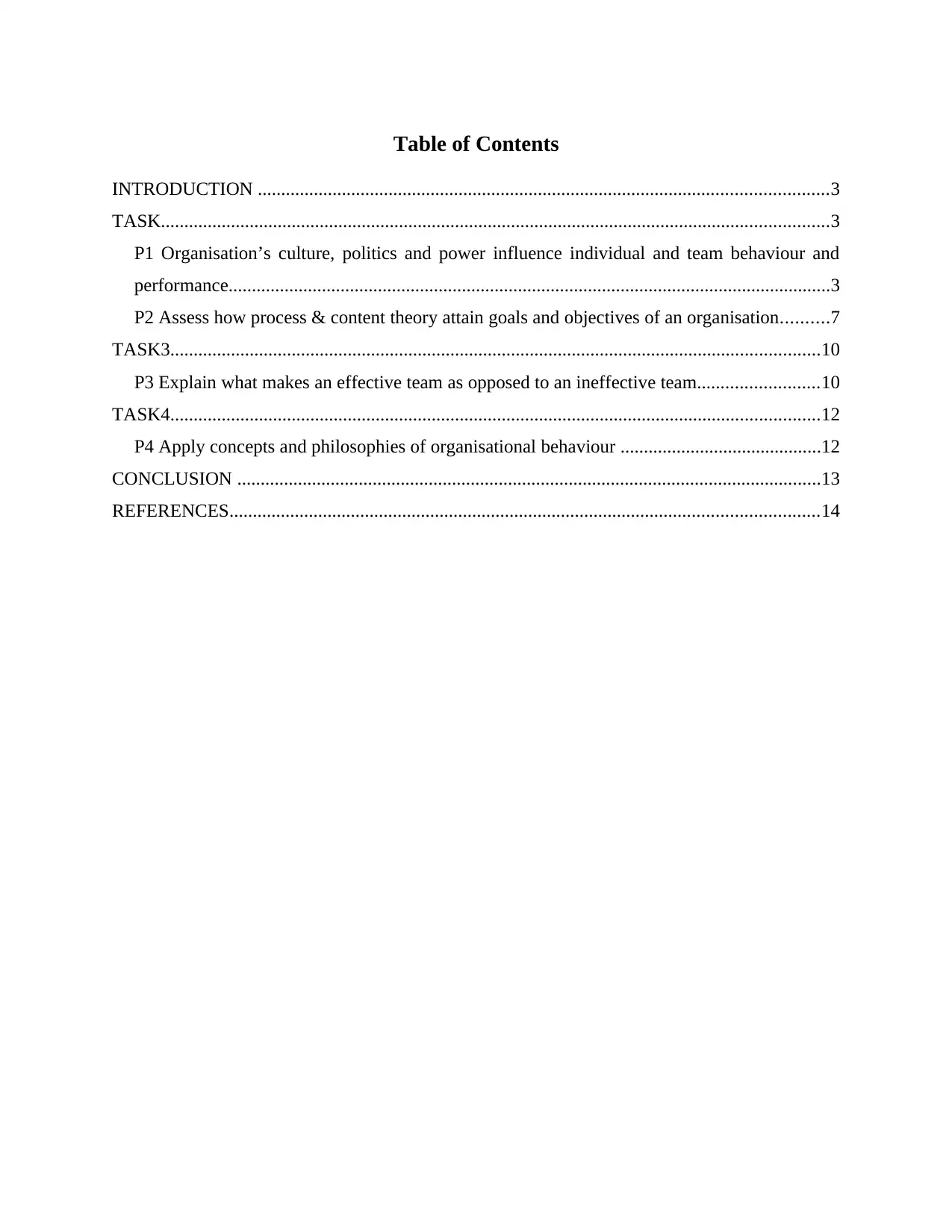
Table of Contents
INTRODUCTION ..........................................................................................................................3
TASK...............................................................................................................................................3
P1 Organisation’s culture, politics and power influence individual and team behaviour and
performance.................................................................................................................................3
P2 Assess how process & content theory attain goals and objectives of an organisation..........7
TASK3...........................................................................................................................................10
P3 Explain what makes an effective team as opposed to an ineffective team..........................10
TASK4...........................................................................................................................................12
P4 Apply concepts and philosophies of organisational behaviour ...........................................12
CONCLUSION .............................................................................................................................13
REFERENCES..............................................................................................................................14
INTRODUCTION ..........................................................................................................................3
TASK...............................................................................................................................................3
P1 Organisation’s culture, politics and power influence individual and team behaviour and
performance.................................................................................................................................3
P2 Assess how process & content theory attain goals and objectives of an organisation..........7
TASK3...........................................................................................................................................10
P3 Explain what makes an effective team as opposed to an ineffective team..........................10
TASK4...........................................................................................................................................12
P4 Apply concepts and philosophies of organisational behaviour ...........................................12
CONCLUSION .............................................................................................................................13
REFERENCES..............................................................................................................................14
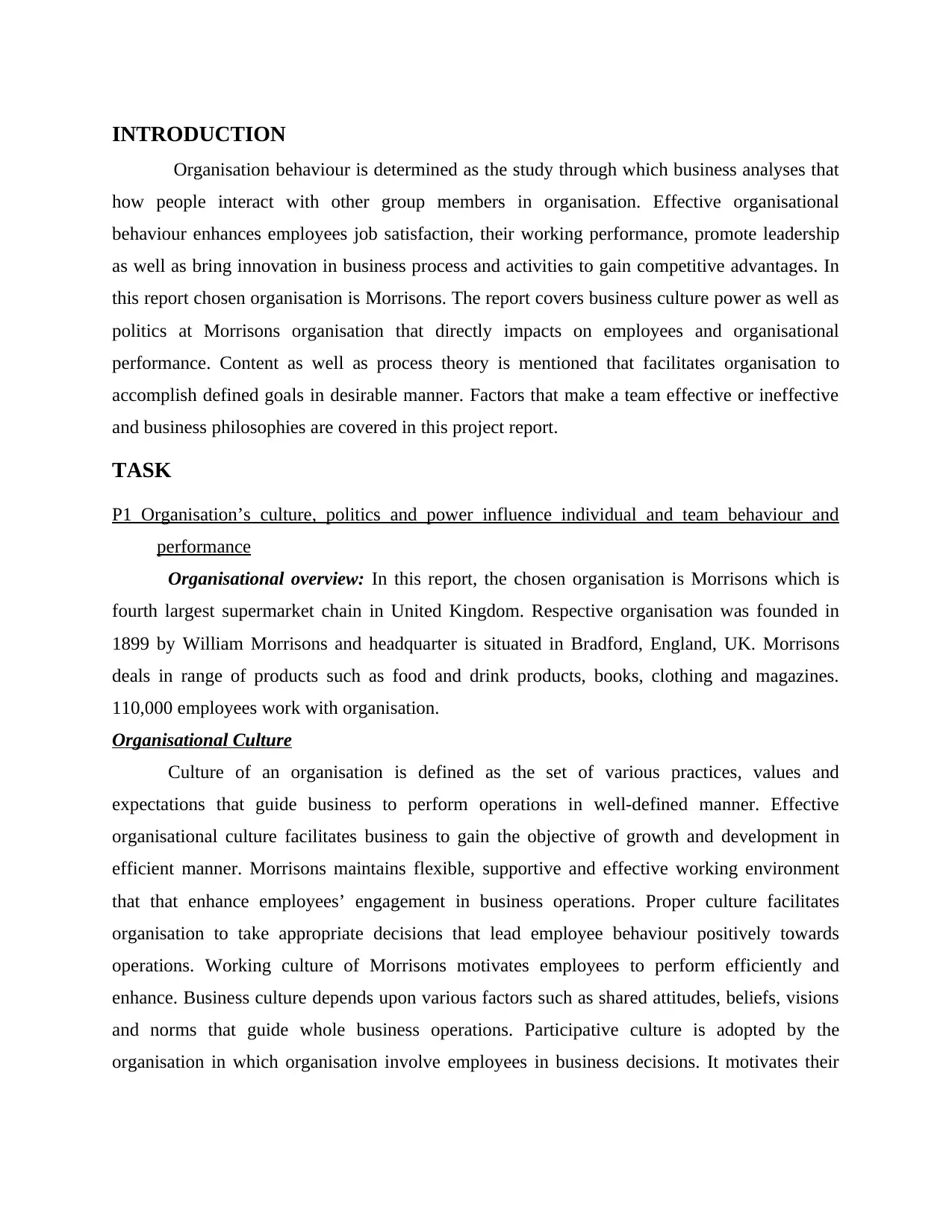
INTRODUCTION
Organisation behaviour is determined as the study through which business analyses that
how people interact with other group members in organisation. Effective organisational
behaviour enhances employees job satisfaction, their working performance, promote leadership
as well as bring innovation in business process and activities to gain competitive advantages. In
this report chosen organisation is Morrisons. The report covers business culture power as well as
politics at Morrisons organisation that directly impacts on employees and organisational
performance. Content as well as process theory is mentioned that facilitates organisation to
accomplish defined goals in desirable manner. Factors that make a team effective or ineffective
and business philosophies are covered in this project report.
TASK
P1 Organisation’s culture, politics and power influence individual and team behaviour and
performance
Organisational overview: In this report, the chosen organisation is Morrisons which is
fourth largest supermarket chain in United Kingdom. Respective organisation was founded in
1899 by William Morrisons and headquarter is situated in Bradford, England, UK. Morrisons
deals in range of products such as food and drink products, books, clothing and magazines.
110,000 employees work with organisation.
Organisational Culture
Culture of an organisation is defined as the set of various practices, values and
expectations that guide business to perform operations in well-defined manner. Effective
organisational culture facilitates business to gain the objective of growth and development in
efficient manner. Morrisons maintains flexible, supportive and effective working environment
that that enhance employees’ engagement in business operations. Proper culture facilitates
organisation to take appropriate decisions that lead employee behaviour positively towards
operations. Working culture of Morrisons motivates employees to perform efficiently and
enhance. Business culture depends upon various factors such as shared attitudes, beliefs, visions
and norms that guide whole business operations. Participative culture is adopted by the
organisation in which organisation involve employees in business decisions. It motivates their
Organisation behaviour is determined as the study through which business analyses that
how people interact with other group members in organisation. Effective organisational
behaviour enhances employees job satisfaction, their working performance, promote leadership
as well as bring innovation in business process and activities to gain competitive advantages. In
this report chosen organisation is Morrisons. The report covers business culture power as well as
politics at Morrisons organisation that directly impacts on employees and organisational
performance. Content as well as process theory is mentioned that facilitates organisation to
accomplish defined goals in desirable manner. Factors that make a team effective or ineffective
and business philosophies are covered in this project report.
TASK
P1 Organisation’s culture, politics and power influence individual and team behaviour and
performance
Organisational overview: In this report, the chosen organisation is Morrisons which is
fourth largest supermarket chain in United Kingdom. Respective organisation was founded in
1899 by William Morrisons and headquarter is situated in Bradford, England, UK. Morrisons
deals in range of products such as food and drink products, books, clothing and magazines.
110,000 employees work with organisation.
Organisational Culture
Culture of an organisation is defined as the set of various practices, values and
expectations that guide business to perform operations in well-defined manner. Effective
organisational culture facilitates business to gain the objective of growth and development in
efficient manner. Morrisons maintains flexible, supportive and effective working environment
that that enhance employees’ engagement in business operations. Proper culture facilitates
organisation to take appropriate decisions that lead employee behaviour positively towards
operations. Working culture of Morrisons motivates employees to perform efficiently and
enhance. Business culture depends upon various factors such as shared attitudes, beliefs, visions
and norms that guide whole business operations. Participative culture is adopted by the
organisation in which organisation involve employees in business decisions. It motivates their
⊘ This is a preview!⊘
Do you want full access?
Subscribe today to unlock all pages.

Trusted by 1+ million students worldwide
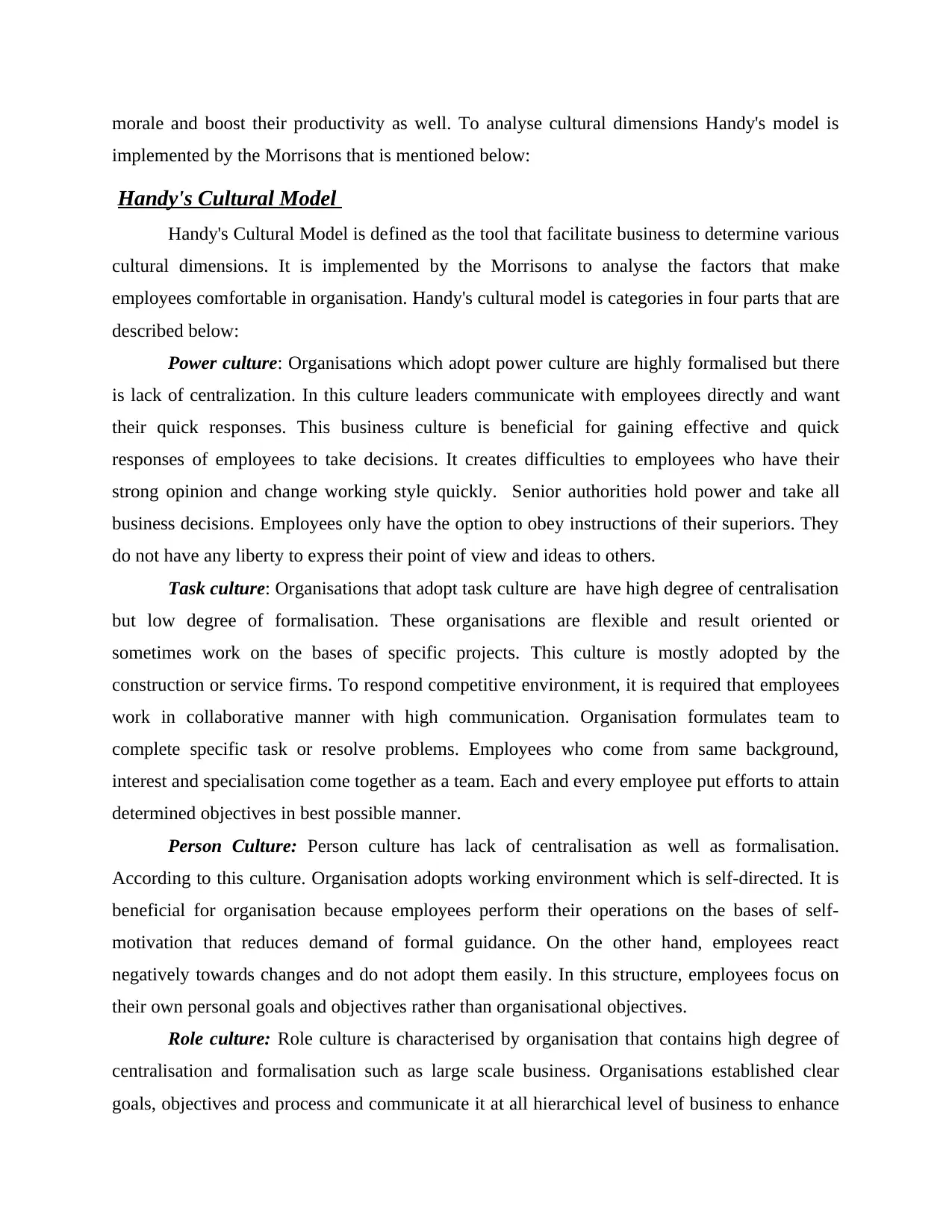
morale and boost their productivity as well. To analyse cultural dimensions Handy's model is
implemented by the Morrisons that is mentioned below:
Handy's Cultural Model
Handy's Cultural Model is defined as the tool that facilitate business to determine various
cultural dimensions. It is implemented by the Morrisons to analyse the factors that make
employees comfortable in organisation. Handy's cultural model is categories in four parts that are
described below:
Power culture: Organisations which adopt power culture are highly formalised but there
is lack of centralization. In this culture leaders communicate with employees directly and want
their quick responses. This business culture is beneficial for gaining effective and quick
responses of employees to take decisions. It creates difficulties to employees who have their
strong opinion and change working style quickly. Senior authorities hold power and take all
business decisions. Employees only have the option to obey instructions of their superiors. They
do not have any liberty to express their point of view and ideas to others.
Task culture: Organisations that adopt task culture are have high degree of centralisation
but low degree of formalisation. These organisations are flexible and result oriented or
sometimes work on the bases of specific projects. This culture is mostly adopted by the
construction or service firms. To respond competitive environment, it is required that employees
work in collaborative manner with high communication. Organisation formulates team to
complete specific task or resolve problems. Employees who come from same background,
interest and specialisation come together as a team. Each and every employee put efforts to attain
determined objectives in best possible manner.
Person Culture: Person culture has lack of centralisation as well as formalisation.
According to this culture. Organisation adopts working environment which is self-directed. It is
beneficial for organisation because employees perform their operations on the bases of self-
motivation that reduces demand of formal guidance. On the other hand, employees react
negatively towards changes and do not adopt them easily. In this structure, employees focus on
their own personal goals and objectives rather than organisational objectives.
Role culture: Role culture is characterised by organisation that contains high degree of
centralisation and formalisation such as large scale business. Organisations established clear
goals, objectives and process and communicate it at all hierarchical level of business to enhance
implemented by the Morrisons that is mentioned below:
Handy's Cultural Model
Handy's Cultural Model is defined as the tool that facilitate business to determine various
cultural dimensions. It is implemented by the Morrisons to analyse the factors that make
employees comfortable in organisation. Handy's cultural model is categories in four parts that are
described below:
Power culture: Organisations which adopt power culture are highly formalised but there
is lack of centralization. In this culture leaders communicate with employees directly and want
their quick responses. This business culture is beneficial for gaining effective and quick
responses of employees to take decisions. It creates difficulties to employees who have their
strong opinion and change working style quickly. Senior authorities hold power and take all
business decisions. Employees only have the option to obey instructions of their superiors. They
do not have any liberty to express their point of view and ideas to others.
Task culture: Organisations that adopt task culture are have high degree of centralisation
but low degree of formalisation. These organisations are flexible and result oriented or
sometimes work on the bases of specific projects. This culture is mostly adopted by the
construction or service firms. To respond competitive environment, it is required that employees
work in collaborative manner with high communication. Organisation formulates team to
complete specific task or resolve problems. Employees who come from same background,
interest and specialisation come together as a team. Each and every employee put efforts to attain
determined objectives in best possible manner.
Person Culture: Person culture has lack of centralisation as well as formalisation.
According to this culture. Organisation adopts working environment which is self-directed. It is
beneficial for organisation because employees perform their operations on the bases of self-
motivation that reduces demand of formal guidance. On the other hand, employees react
negatively towards changes and do not adopt them easily. In this structure, employees focus on
their own personal goals and objectives rather than organisational objectives.
Role culture: Role culture is characterised by organisation that contains high degree of
centralisation and formalisation such as large scale business. Organisations established clear
goals, objectives and process and communicate it at all hierarchical level of business to enhance
Paraphrase This Document
Need a fresh take? Get an instant paraphrase of this document with our AI Paraphraser
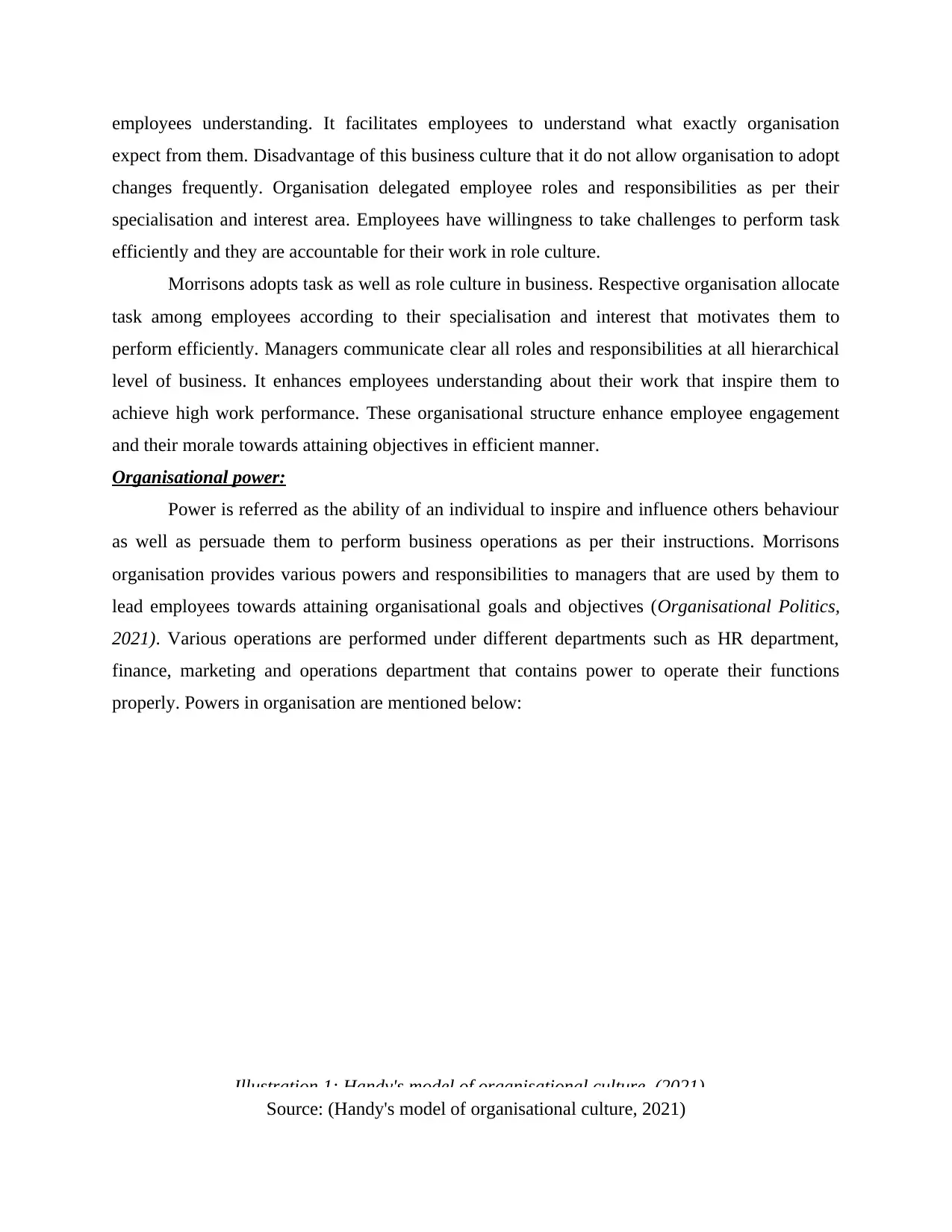
employees understanding. It facilitates employees to understand what exactly organisation
expect from them. Disadvantage of this business culture that it do not allow organisation to adopt
changes frequently. Organisation delegated employee roles and responsibilities as per their
specialisation and interest area. Employees have willingness to take challenges to perform task
efficiently and they are accountable for their work in role culture.
Morrisons adopts task as well as role culture in business. Respective organisation allocate
task among employees according to their specialisation and interest that motivates them to
perform efficiently. Managers communicate clear all roles and responsibilities at all hierarchical
level of business. It enhances employees understanding about their work that inspire them to
achieve high work performance. These organisational structure enhance employee engagement
and their morale towards attaining objectives in efficient manner.
Organisational power:
Power is referred as the ability of an individual to inspire and influence others behaviour
as well as persuade them to perform business operations as per their instructions. Morrisons
organisation provides various powers and responsibilities to managers that are used by them to
lead employees towards attaining organisational goals and objectives (Organisational Politics,
2021). Various operations are performed under different departments such as HR department,
finance, marketing and operations department that contains power to operate their functions
properly. Powers in organisation are mentioned below:
Illustration 1: Handy's model of organisational culture, (2021)
Source: (Handy's model of organisational culture, 2021)
expect from them. Disadvantage of this business culture that it do not allow organisation to adopt
changes frequently. Organisation delegated employee roles and responsibilities as per their
specialisation and interest area. Employees have willingness to take challenges to perform task
efficiently and they are accountable for their work in role culture.
Morrisons adopts task as well as role culture in business. Respective organisation allocate
task among employees according to their specialisation and interest that motivates them to
perform efficiently. Managers communicate clear all roles and responsibilities at all hierarchical
level of business. It enhances employees understanding about their work that inspire them to
achieve high work performance. These organisational structure enhance employee engagement
and their morale towards attaining objectives in efficient manner.
Organisational power:
Power is referred as the ability of an individual to inspire and influence others behaviour
as well as persuade them to perform business operations as per their instructions. Morrisons
organisation provides various powers and responsibilities to managers that are used by them to
lead employees towards attaining organisational goals and objectives (Organisational Politics,
2021). Various operations are performed under different departments such as HR department,
finance, marketing and operations department that contains power to operate their functions
properly. Powers in organisation are mentioned below:
Illustration 1: Handy's model of organisational culture, (2021)
Source: (Handy's model of organisational culture, 2021)
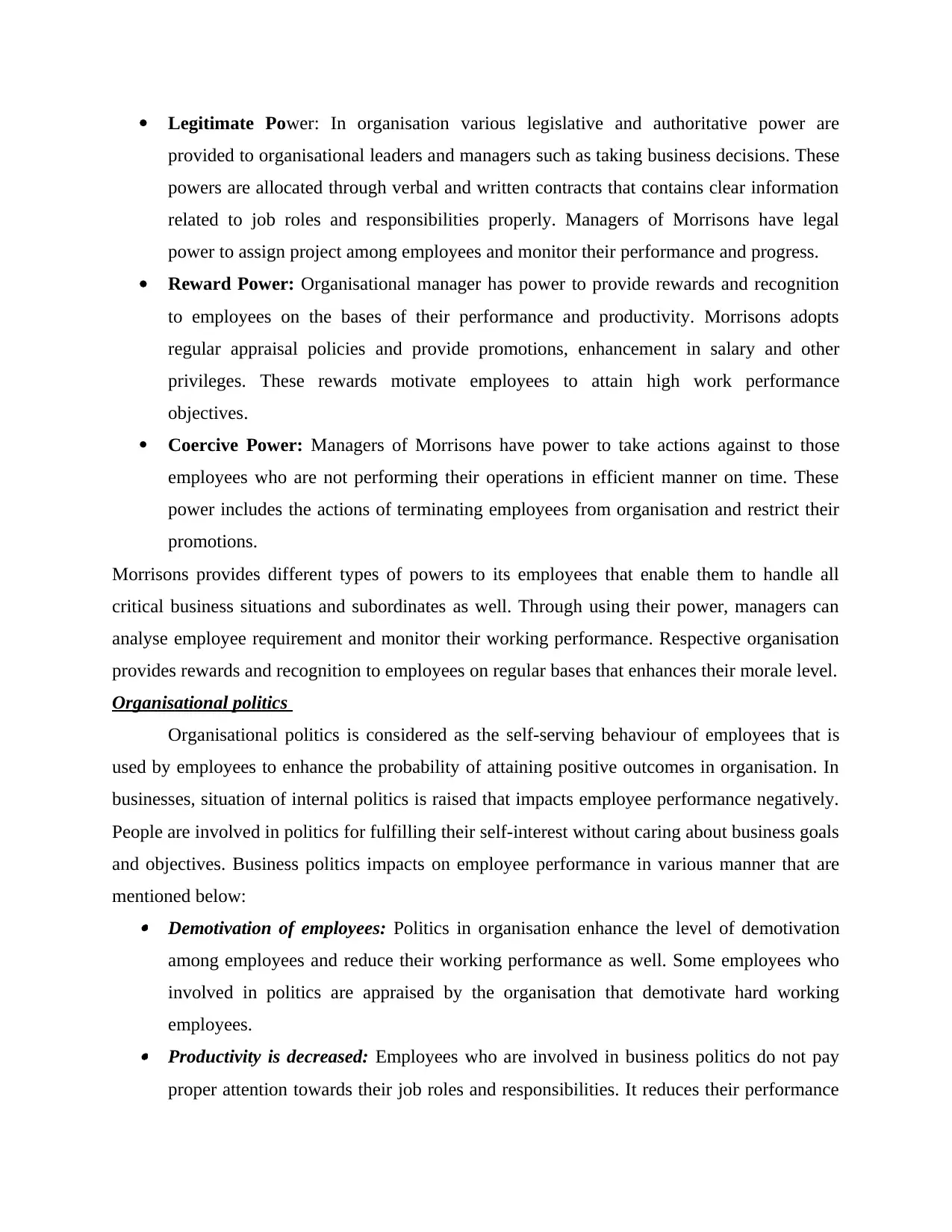
Legitimate Power: In organisation various legislative and authoritative power are
provided to organisational leaders and managers such as taking business decisions. These
powers are allocated through verbal and written contracts that contains clear information
related to job roles and responsibilities properly. Managers of Morrisons have legal
power to assign project among employees and monitor their performance and progress.
Reward Power: Organisational manager has power to provide rewards and recognition
to employees on the bases of their performance and productivity. Morrisons adopts
regular appraisal policies and provide promotions, enhancement in salary and other
privileges. These rewards motivate employees to attain high work performance
objectives.
Coercive Power: Managers of Morrisons have power to take actions against to those
employees who are not performing their operations in efficient manner on time. These
power includes the actions of terminating employees from organisation and restrict their
promotions.
Morrisons provides different types of powers to its employees that enable them to handle all
critical business situations and subordinates as well. Through using their power, managers can
analyse employee requirement and monitor their working performance. Respective organisation
provides rewards and recognition to employees on regular bases that enhances their morale level.
Organisational politics
Organisational politics is considered as the self-serving behaviour of employees that is
used by employees to enhance the probability of attaining positive outcomes in organisation. In
businesses, situation of internal politics is raised that impacts employee performance negatively.
People are involved in politics for fulfilling their self-interest without caring about business goals
and objectives. Business politics impacts on employee performance in various manner that are
mentioned below: Demotivation of employees: Politics in organisation enhance the level of demotivation
among employees and reduce their working performance as well. Some employees who
involved in politics are appraised by the organisation that demotivate hard working
employees. Productivity is decreased: Employees who are involved in business politics do not pay
proper attention towards their job roles and responsibilities. It reduces their performance
provided to organisational leaders and managers such as taking business decisions. These
powers are allocated through verbal and written contracts that contains clear information
related to job roles and responsibilities properly. Managers of Morrisons have legal
power to assign project among employees and monitor their performance and progress.
Reward Power: Organisational manager has power to provide rewards and recognition
to employees on the bases of their performance and productivity. Morrisons adopts
regular appraisal policies and provide promotions, enhancement in salary and other
privileges. These rewards motivate employees to attain high work performance
objectives.
Coercive Power: Managers of Morrisons have power to take actions against to those
employees who are not performing their operations in efficient manner on time. These
power includes the actions of terminating employees from organisation and restrict their
promotions.
Morrisons provides different types of powers to its employees that enable them to handle all
critical business situations and subordinates as well. Through using their power, managers can
analyse employee requirement and monitor their working performance. Respective organisation
provides rewards and recognition to employees on regular bases that enhances their morale level.
Organisational politics
Organisational politics is considered as the self-serving behaviour of employees that is
used by employees to enhance the probability of attaining positive outcomes in organisation. In
businesses, situation of internal politics is raised that impacts employee performance negatively.
People are involved in politics for fulfilling their self-interest without caring about business goals
and objectives. Business politics impacts on employee performance in various manner that are
mentioned below: Demotivation of employees: Politics in organisation enhance the level of demotivation
among employees and reduce their working performance as well. Some employees who
involved in politics are appraised by the organisation that demotivate hard working
employees. Productivity is decreased: Employees who are involved in business politics do not pay
proper attention towards their job roles and responsibilities. It reduces their performance
⊘ This is a preview!⊘
Do you want full access?
Subscribe today to unlock all pages.

Trusted by 1+ million students worldwide
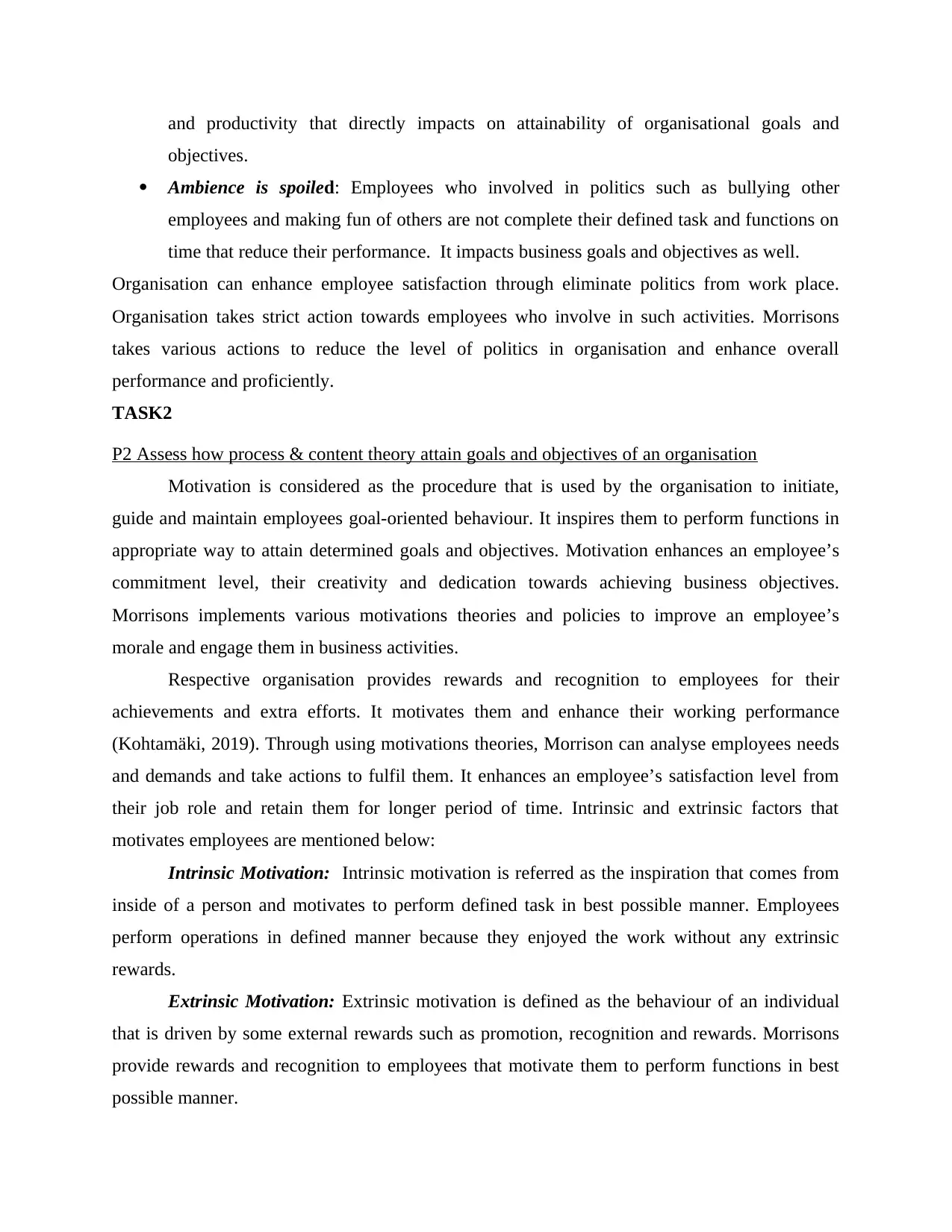
and productivity that directly impacts on attainability of organisational goals and
objectives.
Ambience is spoiled: Employees who involved in politics such as bullying other
employees and making fun of others are not complete their defined task and functions on
time that reduce their performance. It impacts business goals and objectives as well.
Organisation can enhance employee satisfaction through eliminate politics from work place.
Organisation takes strict action towards employees who involve in such activities. Morrisons
takes various actions to reduce the level of politics in organisation and enhance overall
performance and proficiently.
TASK2
P2 Assess how process & content theory attain goals and objectives of an organisation
Motivation is considered as the procedure that is used by the organisation to initiate,
guide and maintain employees goal-oriented behaviour. It inspires them to perform functions in
appropriate way to attain determined goals and objectives. Motivation enhances an employee’s
commitment level, their creativity and dedication towards achieving business objectives.
Morrisons implements various motivations theories and policies to improve an employee’s
morale and engage them in business activities.
Respective organisation provides rewards and recognition to employees for their
achievements and extra efforts. It motivates them and enhance their working performance
(Kohtamäki, 2019). Through using motivations theories, Morrison can analyse employees needs
and demands and take actions to fulfil them. It enhances an employee’s satisfaction level from
their job role and retain them for longer period of time. Intrinsic and extrinsic factors that
motivates employees are mentioned below:
Intrinsic Motivation: Intrinsic motivation is referred as the inspiration that comes from
inside of a person and motivates to perform defined task in best possible manner. Employees
perform operations in defined manner because they enjoyed the work without any extrinsic
rewards.
Extrinsic Motivation: Extrinsic motivation is defined as the behaviour of an individual
that is driven by some external rewards such as promotion, recognition and rewards. Morrisons
provide rewards and recognition to employees that motivate them to perform functions in best
possible manner.
objectives.
Ambience is spoiled: Employees who involved in politics such as bullying other
employees and making fun of others are not complete their defined task and functions on
time that reduce their performance. It impacts business goals and objectives as well.
Organisation can enhance employee satisfaction through eliminate politics from work place.
Organisation takes strict action towards employees who involve in such activities. Morrisons
takes various actions to reduce the level of politics in organisation and enhance overall
performance and proficiently.
TASK2
P2 Assess how process & content theory attain goals and objectives of an organisation
Motivation is considered as the procedure that is used by the organisation to initiate,
guide and maintain employees goal-oriented behaviour. It inspires them to perform functions in
appropriate way to attain determined goals and objectives. Motivation enhances an employee’s
commitment level, their creativity and dedication towards achieving business objectives.
Morrisons implements various motivations theories and policies to improve an employee’s
morale and engage them in business activities.
Respective organisation provides rewards and recognition to employees for their
achievements and extra efforts. It motivates them and enhance their working performance
(Kohtamäki, 2019). Through using motivations theories, Morrison can analyse employees needs
and demands and take actions to fulfil them. It enhances an employee’s satisfaction level from
their job role and retain them for longer period of time. Intrinsic and extrinsic factors that
motivates employees are mentioned below:
Intrinsic Motivation: Intrinsic motivation is referred as the inspiration that comes from
inside of a person and motivates to perform defined task in best possible manner. Employees
perform operations in defined manner because they enjoyed the work without any extrinsic
rewards.
Extrinsic Motivation: Extrinsic motivation is defined as the behaviour of an individual
that is driven by some external rewards such as promotion, recognition and rewards. Morrisons
provide rewards and recognition to employees that motivate them to perform functions in best
possible manner.
Paraphrase This Document
Need a fresh take? Get an instant paraphrase of this document with our AI Paraphraser
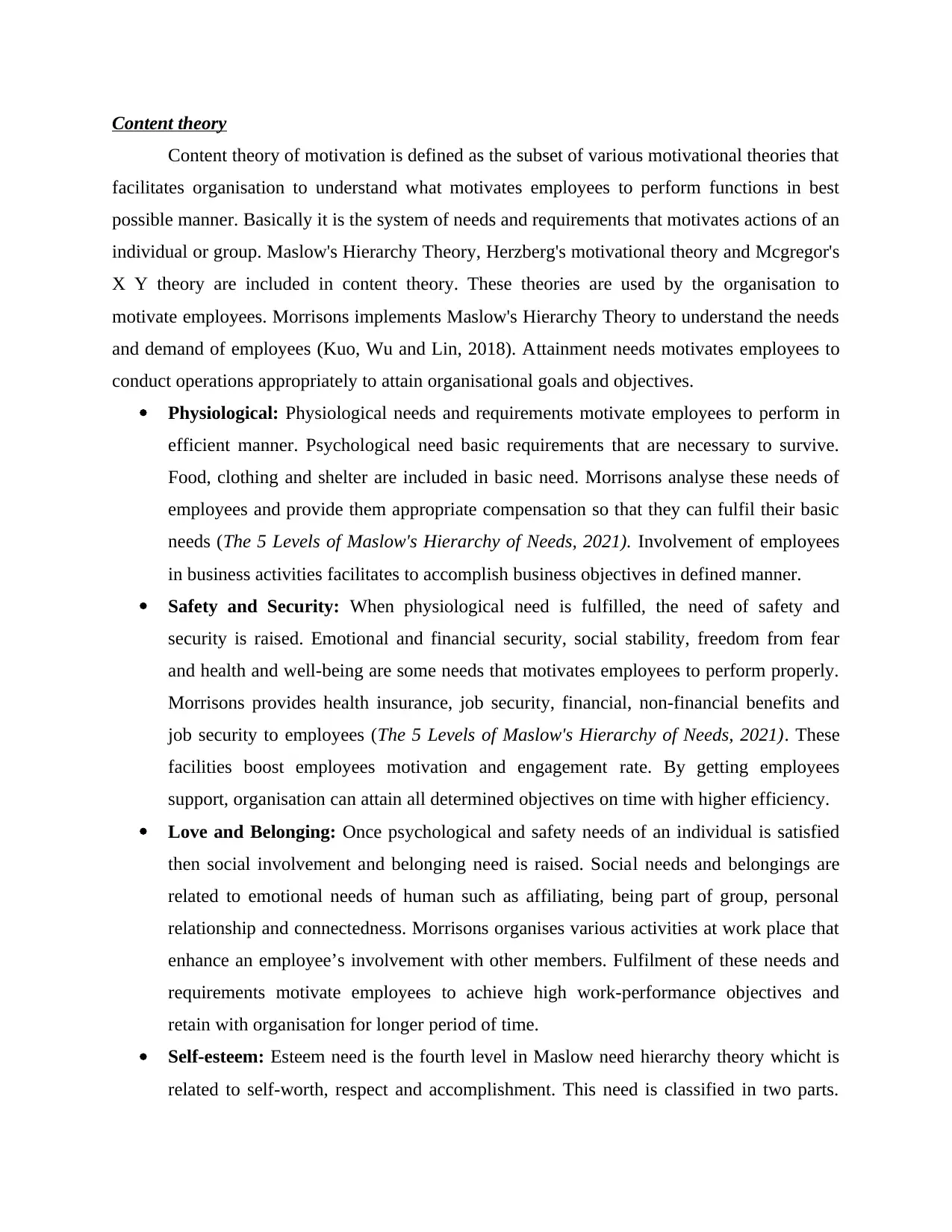
Content theory
Content theory of motivation is defined as the subset of various motivational theories that
facilitates organisation to understand what motivates employees to perform functions in best
possible manner. Basically it is the system of needs and requirements that motivates actions of an
individual or group. Maslow's Hierarchy Theory, Herzberg's motivational theory and Mcgregor's
X Y theory are included in content theory. These theories are used by the organisation to
motivate employees. Morrisons implements Maslow's Hierarchy Theory to understand the needs
and demand of employees (Kuo, Wu and Lin, 2018). Attainment needs motivates employees to
conduct operations appropriately to attain organisational goals and objectives.
Physiological: Physiological needs and requirements motivate employees to perform in
efficient manner. Psychological need basic requirements that are necessary to survive.
Food, clothing and shelter are included in basic need. Morrisons analyse these needs of
employees and provide them appropriate compensation so that they can fulfil their basic
needs (The 5 Levels of Maslow's Hierarchy of Needs, 2021). Involvement of employees
in business activities facilitates to accomplish business objectives in defined manner.
Safety and Security: When physiological need is fulfilled, the need of safety and
security is raised. Emotional and financial security, social stability, freedom from fear
and health and well-being are some needs that motivates employees to perform properly.
Morrisons provides health insurance, job security, financial, non-financial benefits and
job security to employees (The 5 Levels of Maslow's Hierarchy of Needs, 2021). These
facilities boost employees motivation and engagement rate. By getting employees
support, organisation can attain all determined objectives on time with higher efficiency.
Love and Belonging: Once psychological and safety needs of an individual is satisfied
then social involvement and belonging need is raised. Social needs and belongings are
related to emotional needs of human such as affiliating, being part of group, personal
relationship and connectedness. Morrisons organises various activities at work place that
enhance an employee’s involvement with other members. Fulfilment of these needs and
requirements motivate employees to achieve high work-performance objectives and
retain with organisation for longer period of time.
Self-esteem: Esteem need is the fourth level in Maslow need hierarchy theory whicht is
related to self-worth, respect and accomplishment. This need is classified in two parts.
Content theory of motivation is defined as the subset of various motivational theories that
facilitates organisation to understand what motivates employees to perform functions in best
possible manner. Basically it is the system of needs and requirements that motivates actions of an
individual or group. Maslow's Hierarchy Theory, Herzberg's motivational theory and Mcgregor's
X Y theory are included in content theory. These theories are used by the organisation to
motivate employees. Morrisons implements Maslow's Hierarchy Theory to understand the needs
and demand of employees (Kuo, Wu and Lin, 2018). Attainment needs motivates employees to
conduct operations appropriately to attain organisational goals and objectives.
Physiological: Physiological needs and requirements motivate employees to perform in
efficient manner. Psychological need basic requirements that are necessary to survive.
Food, clothing and shelter are included in basic need. Morrisons analyse these needs of
employees and provide them appropriate compensation so that they can fulfil their basic
needs (The 5 Levels of Maslow's Hierarchy of Needs, 2021). Involvement of employees
in business activities facilitates to accomplish business objectives in defined manner.
Safety and Security: When physiological need is fulfilled, the need of safety and
security is raised. Emotional and financial security, social stability, freedom from fear
and health and well-being are some needs that motivates employees to perform properly.
Morrisons provides health insurance, job security, financial, non-financial benefits and
job security to employees (The 5 Levels of Maslow's Hierarchy of Needs, 2021). These
facilities boost employees motivation and engagement rate. By getting employees
support, organisation can attain all determined objectives on time with higher efficiency.
Love and Belonging: Once psychological and safety needs of an individual is satisfied
then social involvement and belonging need is raised. Social needs and belongings are
related to emotional needs of human such as affiliating, being part of group, personal
relationship and connectedness. Morrisons organises various activities at work place that
enhance an employee’s involvement with other members. Fulfilment of these needs and
requirements motivate employees to achieve high work-performance objectives and
retain with organisation for longer period of time.
Self-esteem: Esteem need is the fourth level in Maslow need hierarchy theory whicht is
related to self-worth, respect and accomplishment. This need is classified in two parts.
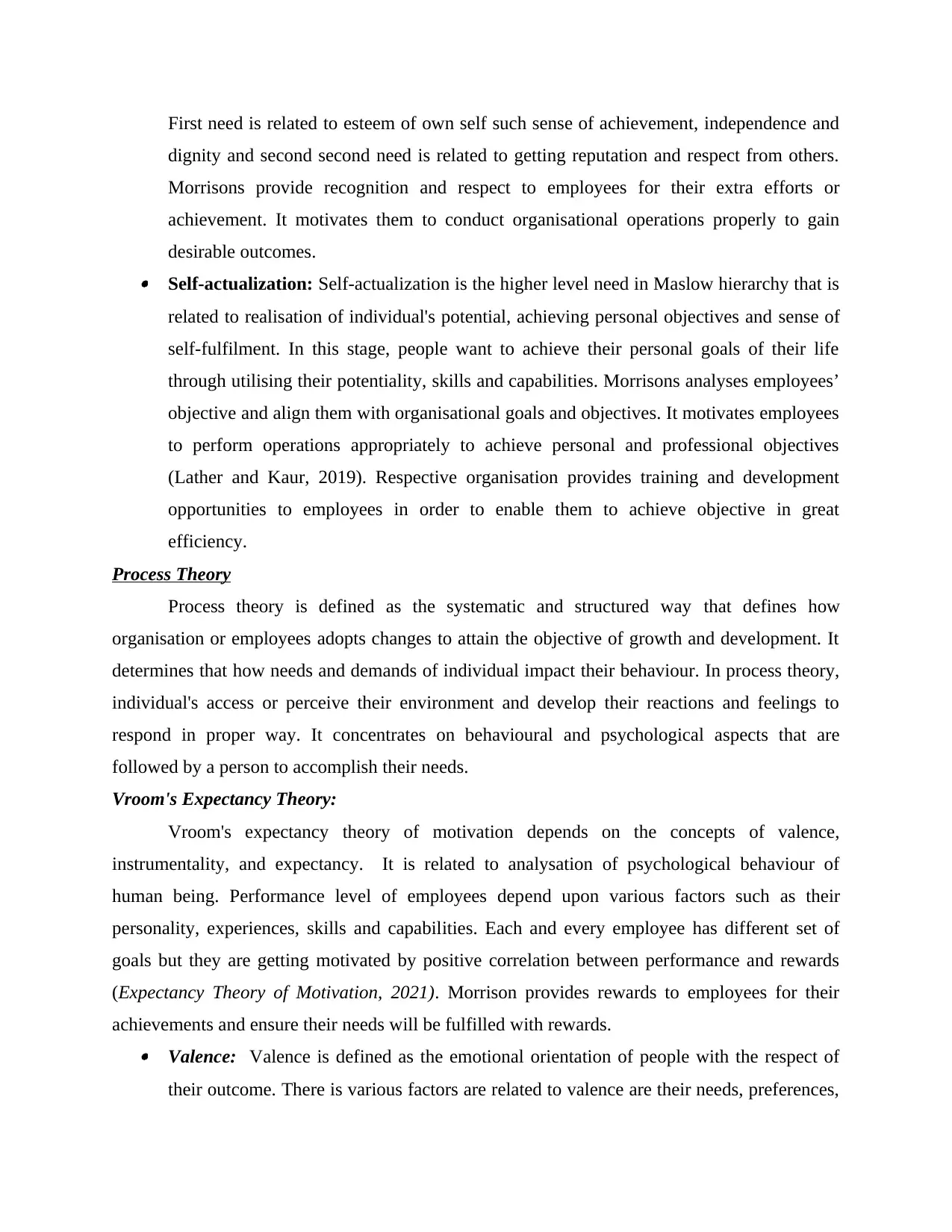
First need is related to esteem of own self such sense of achievement, independence and
dignity and second second need is related to getting reputation and respect from others.
Morrisons provide recognition and respect to employees for their extra efforts or
achievement. It motivates them to conduct organisational operations properly to gain
desirable outcomes. Self-actualization: Self-actualization is the higher level need in Maslow hierarchy that is
related to realisation of individual's potential, achieving personal objectives and sense of
self-fulfilment. In this stage, people want to achieve their personal goals of their life
through utilising their potentiality, skills and capabilities. Morrisons analyses employees’
objective and align them with organisational goals and objectives. It motivates employees
to perform operations appropriately to achieve personal and professional objectives
(Lather and Kaur, 2019). Respective organisation provides training and development
opportunities to employees in order to enable them to achieve objective in great
efficiency.
Process Theory
Process theory is defined as the systematic and structured way that defines how
organisation or employees adopts changes to attain the objective of growth and development. It
determines that how needs and demands of individual impact their behaviour. In process theory,
individual's access or perceive their environment and develop their reactions and feelings to
respond in proper way. It concentrates on behavioural and psychological aspects that are
followed by a person to accomplish their needs.
Vroom's Expectancy Theory:
Vroom's expectancy theory of motivation depends on the concepts of valence,
instrumentality, and expectancy. It is related to analysation of psychological behaviour of
human being. Performance level of employees depend upon various factors such as their
personality, experiences, skills and capabilities. Each and every employee has different set of
goals but they are getting motivated by positive correlation between performance and rewards
(Expectancy Theory of Motivation, 2021). Morrison provides rewards to employees for their
achievements and ensure their needs will be fulfilled with rewards. Valence: Valence is defined as the emotional orientation of people with the respect of
their outcome. There is various factors are related to valence are their needs, preferences,
dignity and second second need is related to getting reputation and respect from others.
Morrisons provide recognition and respect to employees for their extra efforts or
achievement. It motivates them to conduct organisational operations properly to gain
desirable outcomes. Self-actualization: Self-actualization is the higher level need in Maslow hierarchy that is
related to realisation of individual's potential, achieving personal objectives and sense of
self-fulfilment. In this stage, people want to achieve their personal goals of their life
through utilising their potentiality, skills and capabilities. Morrisons analyses employees’
objective and align them with organisational goals and objectives. It motivates employees
to perform operations appropriately to achieve personal and professional objectives
(Lather and Kaur, 2019). Respective organisation provides training and development
opportunities to employees in order to enable them to achieve objective in great
efficiency.
Process Theory
Process theory is defined as the systematic and structured way that defines how
organisation or employees adopts changes to attain the objective of growth and development. It
determines that how needs and demands of individual impact their behaviour. In process theory,
individual's access or perceive their environment and develop their reactions and feelings to
respond in proper way. It concentrates on behavioural and psychological aspects that are
followed by a person to accomplish their needs.
Vroom's Expectancy Theory:
Vroom's expectancy theory of motivation depends on the concepts of valence,
instrumentality, and expectancy. It is related to analysation of psychological behaviour of
human being. Performance level of employees depend upon various factors such as their
personality, experiences, skills and capabilities. Each and every employee has different set of
goals but they are getting motivated by positive correlation between performance and rewards
(Expectancy Theory of Motivation, 2021). Morrison provides rewards to employees for their
achievements and ensure their needs will be fulfilled with rewards. Valence: Valence is defined as the emotional orientation of people with the respect of
their outcome. There is various factors are related to valence are their needs, preferences,
⊘ This is a preview!⊘
Do you want full access?
Subscribe today to unlock all pages.

Trusted by 1+ million students worldwide
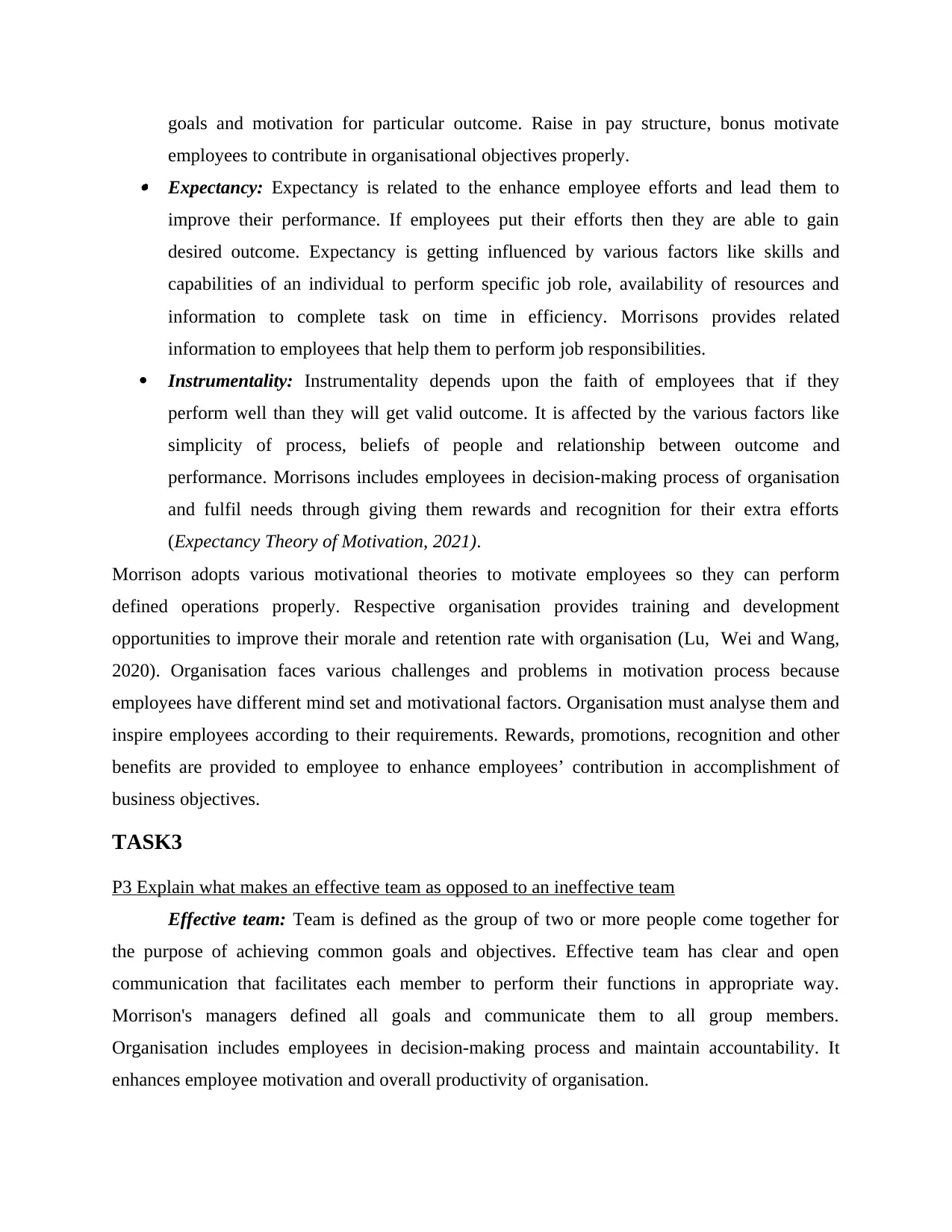
goals and motivation for particular outcome. Raise in pay structure, bonus motivate
employees to contribute in organisational objectives properly. Expectancy: Expectancy is related to the enhance employee efforts and lead them to
improve their performance. If employees put their efforts then they are able to gain
desired outcome. Expectancy is getting influenced by various factors like skills and
capabilities of an individual to perform specific job role, availability of resources and
information to complete task on time in efficiency. Morrisons provides related
information to employees that help them to perform job responsibilities.
Instrumentality: Instrumentality depends upon the faith of employees that if they
perform well than they will get valid outcome. It is affected by the various factors like
simplicity of process, beliefs of people and relationship between outcome and
performance. Morrisons includes employees in decision-making process of organisation
and fulfil needs through giving them rewards and recognition for their extra efforts
(Expectancy Theory of Motivation, 2021).
Morrison adopts various motivational theories to motivate employees so they can perform
defined operations properly. Respective organisation provides training and development
opportunities to improve their morale and retention rate with organisation (Lu, Wei and Wang,
2020). Organisation faces various challenges and problems in motivation process because
employees have different mind set and motivational factors. Organisation must analyse them and
inspire employees according to their requirements. Rewards, promotions, recognition and other
benefits are provided to employee to enhance employees’ contribution in accomplishment of
business objectives.
TASK3
P3 Explain what makes an effective team as opposed to an ineffective team
Effective team: Team is defined as the group of two or more people come together for
the purpose of achieving common goals and objectives. Effective team has clear and open
communication that facilitates each member to perform their functions in appropriate way.
Morrison's managers defined all goals and communicate them to all group members.
Organisation includes employees in decision-making process and maintain accountability. It
enhances employee motivation and overall productivity of organisation.
employees to contribute in organisational objectives properly. Expectancy: Expectancy is related to the enhance employee efforts and lead them to
improve their performance. If employees put their efforts then they are able to gain
desired outcome. Expectancy is getting influenced by various factors like skills and
capabilities of an individual to perform specific job role, availability of resources and
information to complete task on time in efficiency. Morrisons provides related
information to employees that help them to perform job responsibilities.
Instrumentality: Instrumentality depends upon the faith of employees that if they
perform well than they will get valid outcome. It is affected by the various factors like
simplicity of process, beliefs of people and relationship between outcome and
performance. Morrisons includes employees in decision-making process of organisation
and fulfil needs through giving them rewards and recognition for their extra efforts
(Expectancy Theory of Motivation, 2021).
Morrison adopts various motivational theories to motivate employees so they can perform
defined operations properly. Respective organisation provides training and development
opportunities to improve their morale and retention rate with organisation (Lu, Wei and Wang,
2020). Organisation faces various challenges and problems in motivation process because
employees have different mind set and motivational factors. Organisation must analyse them and
inspire employees according to their requirements. Rewards, promotions, recognition and other
benefits are provided to employee to enhance employees’ contribution in accomplishment of
business objectives.
TASK3
P3 Explain what makes an effective team as opposed to an ineffective team
Effective team: Team is defined as the group of two or more people come together for
the purpose of achieving common goals and objectives. Effective team has clear and open
communication that facilitates each member to perform their functions in appropriate way.
Morrison's managers defined all goals and communicate them to all group members.
Organisation includes employees in decision-making process and maintain accountability. It
enhances employee motivation and overall productivity of organisation.
Paraphrase This Document
Need a fresh take? Get an instant paraphrase of this document with our AI Paraphraser
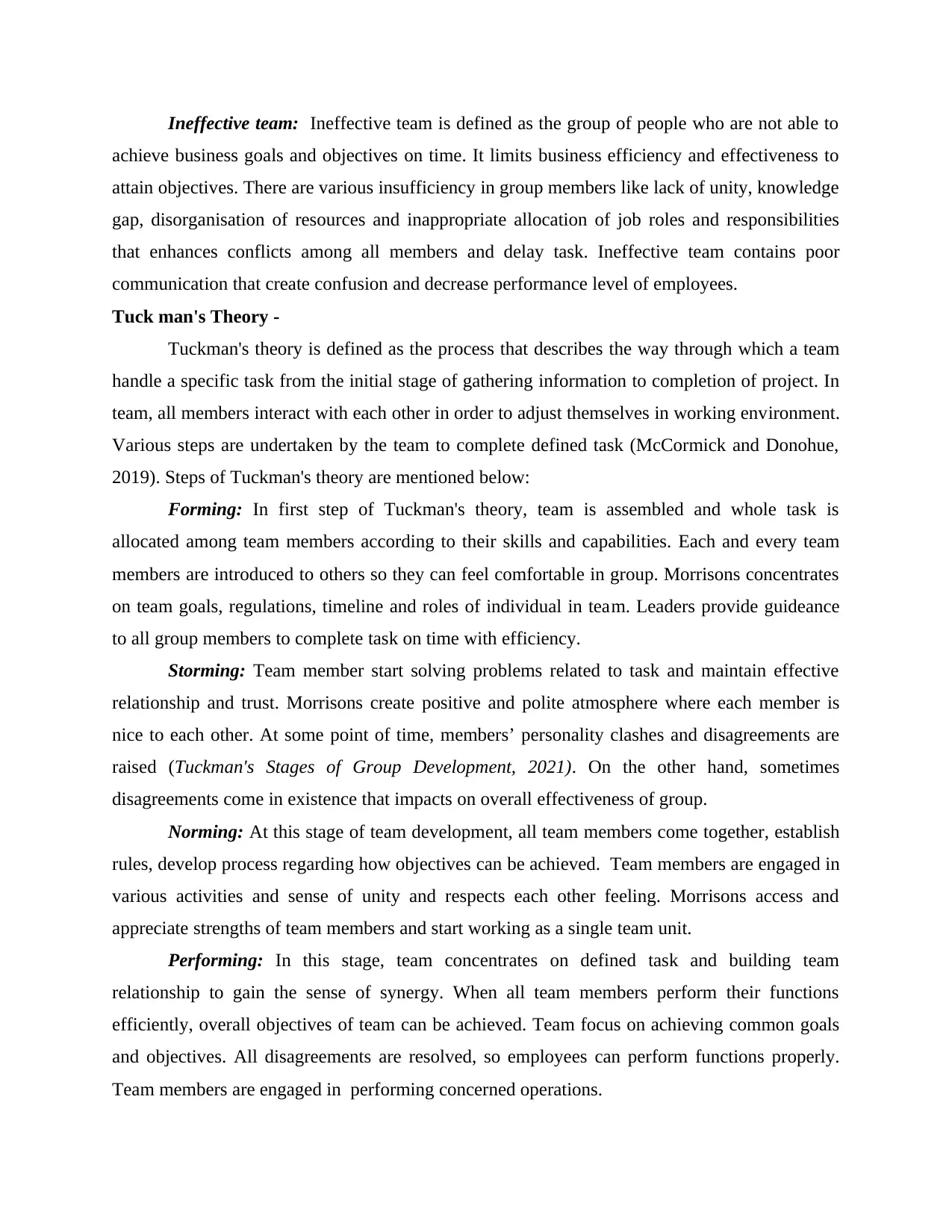
Ineffective team: Ineffective team is defined as the group of people who are not able to
achieve business goals and objectives on time. It limits business efficiency and effectiveness to
attain objectives. There are various insufficiency in group members like lack of unity, knowledge
gap, disorganisation of resources and inappropriate allocation of job roles and responsibilities
that enhances conflicts among all members and delay task. Ineffective team contains poor
communication that create confusion and decrease performance level of employees.
Tuck man's Theory -
Tuckman's theory is defined as the process that describes the way through which a team
handle a specific task from the initial stage of gathering information to completion of project. In
team, all members interact with each other in order to adjust themselves in working environment.
Various steps are undertaken by the team to complete defined task (McCormick and Donohue,
2019). Steps of Tuckman's theory are mentioned below:
Forming: In first step of Tuckman's theory, team is assembled and whole task is
allocated among team members according to their skills and capabilities. Each and every team
members are introduced to others so they can feel comfortable in group. Morrisons concentrates
on team goals, regulations, timeline and roles of individual in team. Leaders provide guideance
to all group members to complete task on time with efficiency.
Storming: Team member start solving problems related to task and maintain effective
relationship and trust. Morrisons create positive and polite atmosphere where each member is
nice to each other. At some point of time, members’ personality clashes and disagreements are
raised (Tuckman's Stages of Group Development, 2021). On the other hand, sometimes
disagreements come in existence that impacts on overall effectiveness of group.
Norming: At this stage of team development, all team members come together, establish
rules, develop process regarding how objectives can be achieved. Team members are engaged in
various activities and sense of unity and respects each other feeling. Morrisons access and
appreciate strengths of team members and start working as a single team unit.
Performing: In this stage, team concentrates on defined task and building team
relationship to gain the sense of synergy. When all team members perform their functions
efficiently, overall objectives of team can be achieved. Team focus on achieving common goals
and objectives. All disagreements are resolved, so employees can perform functions properly.
Team members are engaged in performing concerned operations.
achieve business goals and objectives on time. It limits business efficiency and effectiveness to
attain objectives. There are various insufficiency in group members like lack of unity, knowledge
gap, disorganisation of resources and inappropriate allocation of job roles and responsibilities
that enhances conflicts among all members and delay task. Ineffective team contains poor
communication that create confusion and decrease performance level of employees.
Tuck man's Theory -
Tuckman's theory is defined as the process that describes the way through which a team
handle a specific task from the initial stage of gathering information to completion of project. In
team, all members interact with each other in order to adjust themselves in working environment.
Various steps are undertaken by the team to complete defined task (McCormick and Donohue,
2019). Steps of Tuckman's theory are mentioned below:
Forming: In first step of Tuckman's theory, team is assembled and whole task is
allocated among team members according to their skills and capabilities. Each and every team
members are introduced to others so they can feel comfortable in group. Morrisons concentrates
on team goals, regulations, timeline and roles of individual in team. Leaders provide guideance
to all group members to complete task on time with efficiency.
Storming: Team member start solving problems related to task and maintain effective
relationship and trust. Morrisons create positive and polite atmosphere where each member is
nice to each other. At some point of time, members’ personality clashes and disagreements are
raised (Tuckman's Stages of Group Development, 2021). On the other hand, sometimes
disagreements come in existence that impacts on overall effectiveness of group.
Norming: At this stage of team development, all team members come together, establish
rules, develop process regarding how objectives can be achieved. Team members are engaged in
various activities and sense of unity and respects each other feeling. Morrisons access and
appreciate strengths of team members and start working as a single team unit.
Performing: In this stage, team concentrates on defined task and building team
relationship to gain the sense of synergy. When all team members perform their functions
efficiently, overall objectives of team can be achieved. Team focus on achieving common goals
and objectives. All disagreements are resolved, so employees can perform functions properly.
Team members are engaged in performing concerned operations.
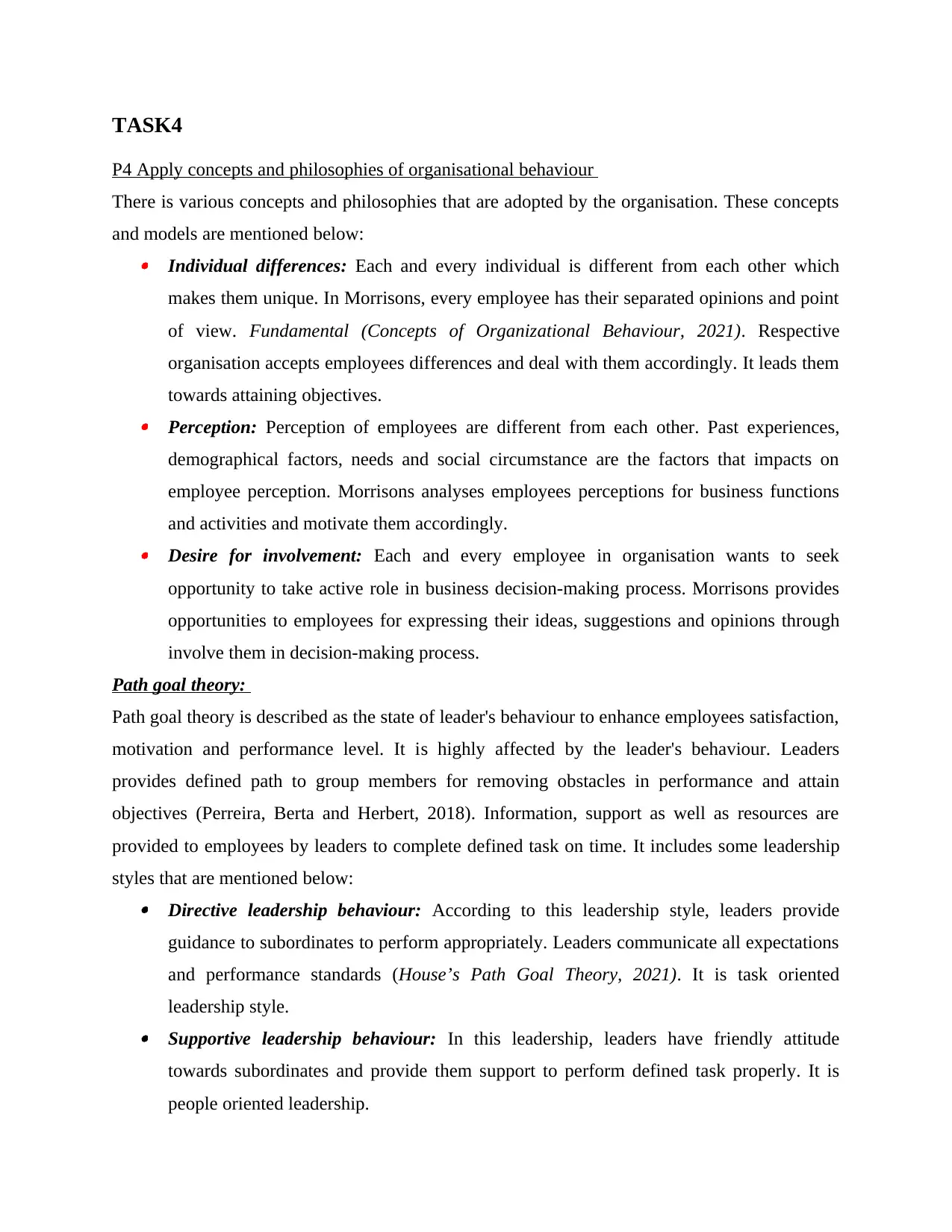
TASK4
P4 Apply concepts and philosophies of organisational behaviour
There is various concepts and philosophies that are adopted by the organisation. These concepts
and models are mentioned below: Individual differences: Each and every individual is different from each other which
makes them unique. In Morrisons, every employee has their separated opinions and point
of view. Fundamental (Concepts of Organizational Behaviour, 2021). Respective
organisation accepts employees differences and deal with them accordingly. It leads them
towards attaining objectives. Perception: Perception of employees are different from each other. Past experiences,
demographical factors, needs and social circumstance are the factors that impacts on
employee perception. Morrisons analyses employees perceptions for business functions
and activities and motivate them accordingly. Desire for involvement: Each and every employee in organisation wants to seek
opportunity to take active role in business decision-making process. Morrisons provides
opportunities to employees for expressing their ideas, suggestions and opinions through
involve them in decision-making process.
Path goal theory:
Path goal theory is described as the state of leader's behaviour to enhance employees satisfaction,
motivation and performance level. It is highly affected by the leader's behaviour. Leaders
provides defined path to group members for removing obstacles in performance and attain
objectives (Perreira, Berta and Herbert, 2018). Information, support as well as resources are
provided to employees by leaders to complete defined task on time. It includes some leadership
styles that are mentioned below: Directive leadership behaviour: According to this leadership style, leaders provide
guidance to subordinates to perform appropriately. Leaders communicate all expectations
and performance standards (House’s Path Goal Theory, 2021). It is task oriented
leadership style. Supportive leadership behaviour: In this leadership, leaders have friendly attitude
towards subordinates and provide them support to perform defined task properly. It is
people oriented leadership.
P4 Apply concepts and philosophies of organisational behaviour
There is various concepts and philosophies that are adopted by the organisation. These concepts
and models are mentioned below: Individual differences: Each and every individual is different from each other which
makes them unique. In Morrisons, every employee has their separated opinions and point
of view. Fundamental (Concepts of Organizational Behaviour, 2021). Respective
organisation accepts employees differences and deal with them accordingly. It leads them
towards attaining objectives. Perception: Perception of employees are different from each other. Past experiences,
demographical factors, needs and social circumstance are the factors that impacts on
employee perception. Morrisons analyses employees perceptions for business functions
and activities and motivate them accordingly. Desire for involvement: Each and every employee in organisation wants to seek
opportunity to take active role in business decision-making process. Morrisons provides
opportunities to employees for expressing their ideas, suggestions and opinions through
involve them in decision-making process.
Path goal theory:
Path goal theory is described as the state of leader's behaviour to enhance employees satisfaction,
motivation and performance level. It is highly affected by the leader's behaviour. Leaders
provides defined path to group members for removing obstacles in performance and attain
objectives (Perreira, Berta and Herbert, 2018). Information, support as well as resources are
provided to employees by leaders to complete defined task on time. It includes some leadership
styles that are mentioned below: Directive leadership behaviour: According to this leadership style, leaders provide
guidance to subordinates to perform appropriately. Leaders communicate all expectations
and performance standards (House’s Path Goal Theory, 2021). It is task oriented
leadership style. Supportive leadership behaviour: In this leadership, leaders have friendly attitude
towards subordinates and provide them support to perform defined task properly. It is
people oriented leadership.
⊘ This is a preview!⊘
Do you want full access?
Subscribe today to unlock all pages.

Trusted by 1+ million students worldwide
1 out of 17
Related Documents
Your All-in-One AI-Powered Toolkit for Academic Success.
+13062052269
info@desklib.com
Available 24*7 on WhatsApp / Email
![[object Object]](/_next/static/media/star-bottom.7253800d.svg)
Unlock your academic potential
Copyright © 2020–2026 A2Z Services. All Rights Reserved. Developed and managed by ZUCOL.



